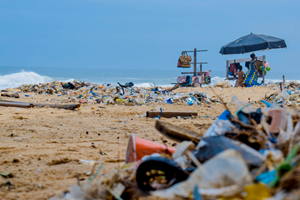Industrial Resin Recycling Diversifies by Looking Beyond Automotive
Recycler equips for new business in medical, housewares and carpeting.
Just about an hour’s drive northwest of the Motor City itself, Industrial Resin Recycling (IRR) was built on the auto industry. It’s still a major part of the business, and truckloads of molded parts roll in every week from Tier 1 automotive suppliers (suppliers that work directly with OEMs), but today IRR is equipped to handle a much wider range of products from a variety of sources.
IRR has been in business for over 35 years, reprocessing automotive materials and adding extrusion capabilities in the mid-1990s. At that time, IRR began using impact modifiers to alter the mechanical properties and create a higher performing recycled compound. The company has two facilities in Michigan, positioning it near automotive component manufacturers that are its biggest suppliers/customers. About 30% of IRR’s business is part of tolling arrangements, the rest is sold into other applications.

Bob (left) and Trevor Houston (foreground) with a benchtop press in the IRR laboratory. Source: Matt Stonecash
Adaptable Logistical Infrastructure for an Industry in Flux
IRR has a fleet of seven trucks and a large collection of trailers, enabling the company to pick up recyclable materials on call and even leave trailers at suppliers’ facilities to be filled. Howell, Michigan, serves as the company’s headquarters and size reduction facility, where scrap material is collected, disassembled, shredded, ground and washed. The grounds measure 5 acres, giving IRR the flexibility to store large quantities of scrap material for processing. This enables the recycling operation to build up inventory when available, and work through it when supply is scarce, such as during the supply chain disruptions during the COVID-19 pandemic.
At its Fowlerville facility, just 10 miles away, recycled materials are further processed to make new pellets. The newest addition there is an MAS conical twin-screw extrusion system with automatic self-cleaning melt filter. This system is run at 4,800 pounds per hour and could run higher on cleaner materials, but running with imperfect material is where its capabilities shine.
According to Bob Houston, founder and owner at IRR, the system has saved a lot of time and labor previously associated with stopping the line to clean screens. The MAS system detects pressure changes that indicate the screen is becoming occluded. Automatically, a scraper passes over the screen removing the contamination. Because some plastic is removed along with the debris, the resulting patty can be processed again to extract additional valuable polypropylene. John Sodini, general manager at IRR, says the extrusion system has increased output by around 80%.

Operator configures MAS extruder settings. Source: Matt Stonecash

MAS extruder with magnetic separator system and melt filter. At left are collected patties of scrap from the melt filter, which will be reprocessed to extract usable polypropylene. Source: Matt Stonecash
IRR is currently refurbishing its 8-inch Davis Standard extruder, which will be mostly dedicated to recycling polystyrene. This activity will bring the screw/barrel gap back to optimum and will also include a controls upgrade. One of the areas IRR is expanding into is clothes hanger recycling, which is a mixture of PP and PS. Throughput on the polystyrene line, when placed back in service, is expected to be 3,500 lbs per hour.
Recycling automotive products remains a very important business for IRR. According to Trevor Houston, vice president of sales at IRR, the company processes a minimum of 80,000 lbs of fuel tanks every week. The HDPE, EVOH-lined tanks occasionally end up misshapen in the blow molding process. The tanks are pressurized and the pressure decay monitored. If they fail the leak test, they become scrap. After being recycled at IRR, these postindustrial gas tanks can become material used in plastic decking, drainage pipes and agricultural products.

These gas tanks, composed mainly of HDPE, will be recycled for sale into a variety of applications. Source: Matt Stonecash
Expanding Beyond Automotive
In recent years, the company has been growing and diversifying its capabilities, looking beyond the automotive industries both for growth and to ameliorate the impact of events in one industry. “Over the last two years, we’ve been able to increase our capacity by 50%,” Trevor Houston says. “We’re getting into different things now, such as hangers, trying to expand out of automotive.” Some examples include polypropylene trim parts, postindustrial syringes, vials, pill bottles and even hospital gowns.
An illustration of variability of the automotive industry is the recent pullback in electric vehicle (EV) programs. For example, Ford recently announced it is pausing production of the F150 Lightning EV pickup truck, to bring production in-line with lower demand than expected. The pause and reduced production is in turn expected to impact Ford’s suppliers, the molding operations that also supply scrap to IRR.
“In addition to the fact that we’ve increased our capacity, we’re trying to augment where there’s a fluctuation in the segments — and all of them fluctuate for the most part,” Sodini says.

In this dispenser pump application, the polypropylene pump is ground up with the metal spring still inside. The metal pieces are removed by subsequent processes. Source: Matt Stonecash
IRR is also expanding into materials such as commercial carpeting and household goods. IRR’s Piedmont, Alabama, facility is key to this move. There, IRR is starting up a new line purchased from NGR for processing carpeting and other materials. The line features a large water-cooled shredding system, feeder and extruder. Piedmont is about 90 miles from Dalton, Georgia, the “Carpet Capital of the World.” The company is developing a technique for removing the hard filler materials from carpet backing.
Delivering Consistent Quality
Bob Houston attributes the company’s longevity in a challenging market to the consistent quality of its materials and services. With the new recycling equipment online, the company estimates capacity at around 50 million pounds per year, and rejection rate is less than 4% across the company.
“We test every box coming off the line; we make mold plaques to make sure there is no contaminant. Then we do a blend, and we test the blend as well,” Trevor Houston says. “So each box from the time it comes in the door to the time it leaves, is tested three times.” Lab capabilities include melt index, moisture analysis, FTIR, molding and extrusion of test samples, as well as mechanical properties testing.
One of the biggest challenges has come from contamination of incoming material. Contamination can take the form of the wrong type of plastic, or it can be something more serious — such as bolts and other hardware that can wreak havoc on size reduction equipment. IRR must work in cooperation with suppliers to make sure these materials don’t get slipped into the feedstock by a careless worker. “The culture has changed at molding plants,” Bob Houston says. “It used to be, ‘Well you’re the recycler; you’re supposed to catch it,’ and now they want to use it as a profit center, as a recovery point — which is sometimes shared with the employees now.”
Since 2008, the ISO 9000 standard has provided the framework for the quality systems at IRR. Each year, the company is audited both internally and externally to keep the certification up to date. “It truly has made us a better company,” Bob Houston says. “If someone asks for some documentation, it’s accessible. We have the weight of every box.”

John Sodini (left) and Trevor Houston (right) with a VAZ 1300 Vecoplan shredder, being used to process postindustrial medical syringes. Source: Matt Stonecash.
IRR is currently expecting to imminently receive Green Circle Certification, a third-party program that certifies sustainable business operations and products. The company is also working toward A2LA certification for its laboratory. IRR offers reprocessed and compounded PP, reprocessed engineering resins and postconsumer content PP and PS. All products are made with recycled plastic, with no blending of virgin resin.
The plastics market is a moving and unpredictable target, but IRR is preparing to adapt to future conditions as they arise. “We’ve seen a shift, and we have capacity now to augment our market with health care and other consumers. When — I’m going to say when — auto picks up again, we will be ready to increase our output,” Sodini says.
Related Content
Fungi Makes Meal of Polypropylene
University of Sydney researchers identify two strains of fungi that can biodegrade hard to recycle plastics like PP.
Read MoreHow to Optimize Color Evaluation of Recycled Plastics
The right color measurement instrument and good working methods will minimize variability in color evaluation of PCR.
Read MoreICIS Launches: Ask ICIS Generative AI Commodities Assistant
Said to be the first of its kind, this AI assistant will enhance access to ICIS’ intelligence and insights for the energy and chemical markets.
Read MoreGeneral Polymers Thermoplastics to Further Expand Distribution Business
NPE2024: Following the company’s recent partnership buyout, new North American geographic territories are in its sight.
Read MoreRead Next
See Recyclers Close the Loop on Trade Show Production Scrap at NPE2024
A collaboration between show organizer PLASTICS, recycler CPR and size reduction experts WEIMA and Conair recovered and recycled all production scrap at NPE2024.
Read MoreBeyond Prototypes: 8 Ways the Plastics Industry Is Using 3D Printing
Plastics processors are finding applications for 3D printing around the plant and across the supply chain. Here are 8 examples to look for at NPE2024.
Read MoreFor PLASTICS' CEO Seaholm, NPE to Shine Light on Sustainability Successes
With advocacy, communication and sustainability as three main pillars, Seaholm leads a trade association to NPE that ‘is more active today than we have ever been.’
Read More






















